A few years ago I travelled with my crew to the shores of Sarawak, Borneo. Off the western coast we sailed to a wonderful chain of little islands collectively called the Talang-Satang Marine National Park.
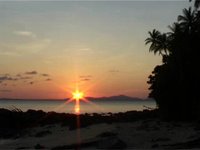 I had travelled all this way for one reason - well a number of reasons actually - but the number one priority was to time our visit to coincide with the arrival of female green turtles, coming ashore to lay their eggs.
I had travelled all this way for one reason - well a number of reasons actually - but the number one priority was to time our visit to coincide with the arrival of female green turtles, coming ashore to lay their eggs.
Now I've witnessed this incredible phenomenon before on the shores of Western Sri Lanka, and back then it was Olive Ridley turtles coming ashore en-masse.
But the magic of this occasion was heightened by the location itself: a tiny, single-beached desert island with a tiny patch of forest; surrounded by a ring of shallow coral reef and crystal clear water - paradise!
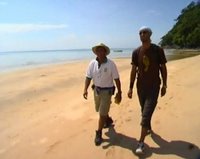
Christopher Kri and I explore
Sarawak's coastline
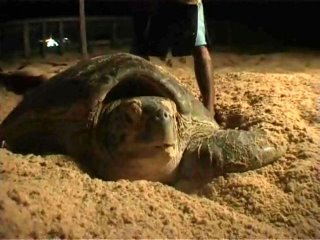 Fortunately our visit was timed almost to the last minute - the night we arrived, 7 turtles came ashore, and I was introduced to them by my guide, Christopher Kri, a local conservationist and all-round good bloke working for the Sarawak Forestry Board. Picture the scene: our tiny beach floodlit by a full moon; the waves sparkling under moonlight and not a sound from any of us, as we waited and waited.
Fortunately our visit was timed almost to the last minute - the night we arrived, 7 turtles came ashore, and I was introduced to them by my guide, Christopher Kri, a local conservationist and all-round good bloke working for the Sarawak Forestry Board. Picture the scene: our tiny beach floodlit by a full moon; the waves sparkling under moonlight and not a sound from any of us, as we waited and waited.
And then all of a sudden one of the rangers spots a dark hulk pulling itself out of the water and up onto the beach. At 3 o'clock in the morning, the Green Turtles had arrived.
Even though their progress on land was painfully slow and laboured, each turtle seemed to single-mindedly know where she was headed. Some traced their characteristic tractor-tread tracks directly to locations close to shore, whereas others meandered here and there all over the beach, spending the best part of two hours finding their desired spot. But sooner or later all seven settled down and started to dig their nests.
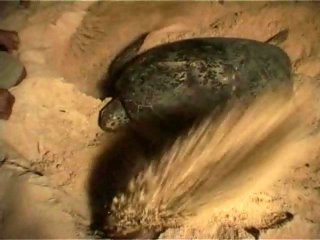 Turtles are easily disturbed during their ponderous movements along the beach. It doesn't take much for them to turn tail and head back to the safety of the water.
Turtles are easily disturbed during their ponderous movements along the beach. It doesn't take much for them to turn tail and head back to the safety of the water.
But once they settle and start their excavations, they go into an almost trance-like state, and its only then that the rangers come in for a closer inspection.
Its now that our friend Christopher comes into his own.
I seldom come across conservationists so deeply attached to their animal subjects, and Chris approaches each turtle with such reverence that you could almost imagine that he's welcoming back long-lost friends.
One turtle caught his attention in particular. Her tag number was 703/746 - but by the end of her long night, we were calling her Princess. Turns out that Princess is a repeat visitor - she has been returning to this island throughout her adult life to continue the cycle. Chris showed me the tag that had been attached to one of her front flippers all those years ago.
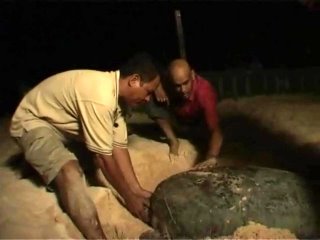
Chris introduces me to his beloved 'Princess'
After each of the turtles finished laying their clutch of eggs and burying this precious cargo under a cleverly concealed mound of sand, they retreated back to sea - hopefully to return in another 3 years.
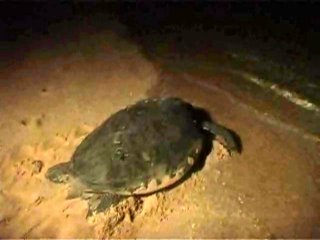 Because of the highly endangered status of the species in this part of the world, each nest is transferred, as soon as the female departs, to the safety of an enclosed hatchery, where the eggs are protected from predators and poachers. Around 58 days later, the babies hatch, and the forestry staff give them a personal escort back to the sea - in hopes that they will return here to lay the foundations for the next generation, some thirty years later...
Because of the highly endangered status of the species in this part of the world, each nest is transferred, as soon as the female departs, to the safety of an enclosed hatchery, where the eggs are protected from predators and poachers. Around 58 days later, the babies hatch, and the forestry staff give them a personal escort back to the sea - in hopes that they will return here to lay the foundations for the next generation, some thirty years later...
Its always an incredible privilege to witness these events in the wild. Every time I have such encounters I always find myself wondering if it'll be the last time I get to see these wonderful animals on their own terms, in their own territory. I guess its a common fear shared by conservationists and wildlife-lovers alike. Still with people like Christopher Kri working incessantly to ensure the welfare of his turtle wards, I still live with these tenacious threads of hope, that the turtles at least will continue to endure, inspite of the decimation they have suffered at our own species' hands.
A short clip of my encounter with Christopher and his turtles...
 I had travelled all this way for one reason - well a number of reasons actually - but the number one priority was to time our visit to coincide with the arrival of female green turtles, coming ashore to lay their eggs.
I had travelled all this way for one reason - well a number of reasons actually - but the number one priority was to time our visit to coincide with the arrival of female green turtles, coming ashore to lay their eggs.Now I've witnessed this incredible phenomenon before on the shores of Western Sri Lanka, and back then it was Olive Ridley turtles coming ashore en-masse.
But the magic of this occasion was heightened by the location itself: a tiny, single-beached desert island with a tiny patch of forest; surrounded by a ring of shallow coral reef and crystal clear water - paradise!

Christopher Kri and I explore
Sarawak's coastline
 Fortunately our visit was timed almost to the last minute - the night we arrived, 7 turtles came ashore, and I was introduced to them by my guide, Christopher Kri, a local conservationist and all-round good bloke working for the Sarawak Forestry Board. Picture the scene: our tiny beach floodlit by a full moon; the waves sparkling under moonlight and not a sound from any of us, as we waited and waited.
Fortunately our visit was timed almost to the last minute - the night we arrived, 7 turtles came ashore, and I was introduced to them by my guide, Christopher Kri, a local conservationist and all-round good bloke working for the Sarawak Forestry Board. Picture the scene: our tiny beach floodlit by a full moon; the waves sparkling under moonlight and not a sound from any of us, as we waited and waited.And then all of a sudden one of the rangers spots a dark hulk pulling itself out of the water and up onto the beach. At 3 o'clock in the morning, the Green Turtles had arrived.
Even though their progress on land was painfully slow and laboured, each turtle seemed to single-mindedly know where she was headed. Some traced their characteristic tractor-tread tracks directly to locations close to shore, whereas others meandered here and there all over the beach, spending the best part of two hours finding their desired spot. But sooner or later all seven settled down and started to dig their nests.
 Turtles are easily disturbed during their ponderous movements along the beach. It doesn't take much for them to turn tail and head back to the safety of the water.
Turtles are easily disturbed during their ponderous movements along the beach. It doesn't take much for them to turn tail and head back to the safety of the water.But once they settle and start their excavations, they go into an almost trance-like state, and its only then that the rangers come in for a closer inspection.
Its now that our friend Christopher comes into his own.
I seldom come across conservationists so deeply attached to their animal subjects, and Chris approaches each turtle with such reverence that you could almost imagine that he's welcoming back long-lost friends.
One turtle caught his attention in particular. Her tag number was 703/746 - but by the end of her long night, we were calling her Princess. Turns out that Princess is a repeat visitor - she has been returning to this island throughout her adult life to continue the cycle. Chris showed me the tag that had been attached to one of her front flippers all those years ago.

Chris introduces me to his beloved 'Princess'
After each of the turtles finished laying their clutch of eggs and burying this precious cargo under a cleverly concealed mound of sand, they retreated back to sea - hopefully to return in another 3 years.
 Because of the highly endangered status of the species in this part of the world, each nest is transferred, as soon as the female departs, to the safety of an enclosed hatchery, where the eggs are protected from predators and poachers. Around 58 days later, the babies hatch, and the forestry staff give them a personal escort back to the sea - in hopes that they will return here to lay the foundations for the next generation, some thirty years later...
Because of the highly endangered status of the species in this part of the world, each nest is transferred, as soon as the female departs, to the safety of an enclosed hatchery, where the eggs are protected from predators and poachers. Around 58 days later, the babies hatch, and the forestry staff give them a personal escort back to the sea - in hopes that they will return here to lay the foundations for the next generation, some thirty years later...Its always an incredible privilege to witness these events in the wild. Every time I have such encounters I always find myself wondering if it'll be the last time I get to see these wonderful animals on their own terms, in their own territory. I guess its a common fear shared by conservationists and wildlife-lovers alike. Still with people like Christopher Kri working incessantly to ensure the welfare of his turtle wards, I still live with these tenacious threads of hope, that the turtles at least will continue to endure, inspite of the decimation they have suffered at our own species' hands.
A short clip of my encounter with Christopher and his turtles...

No comments:
Post a Comment